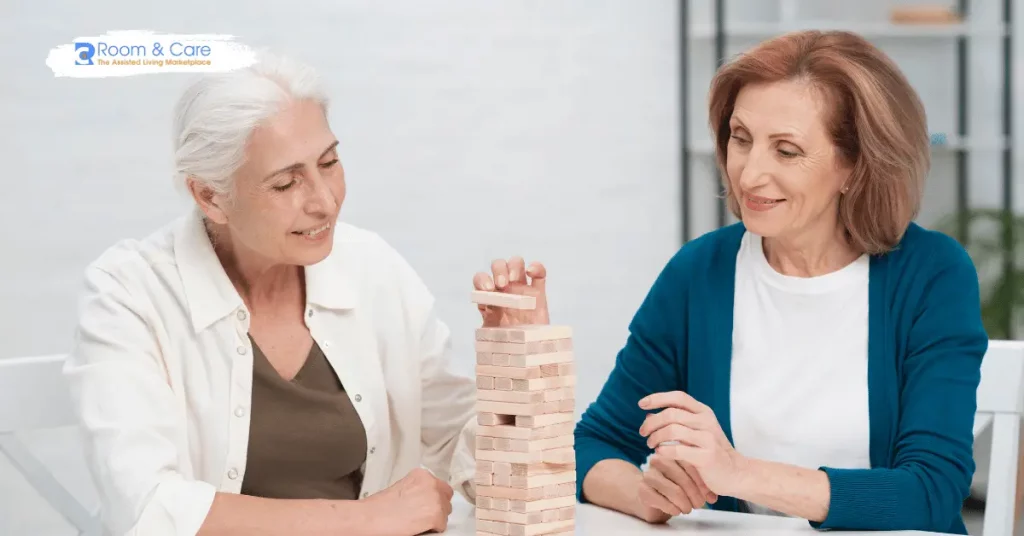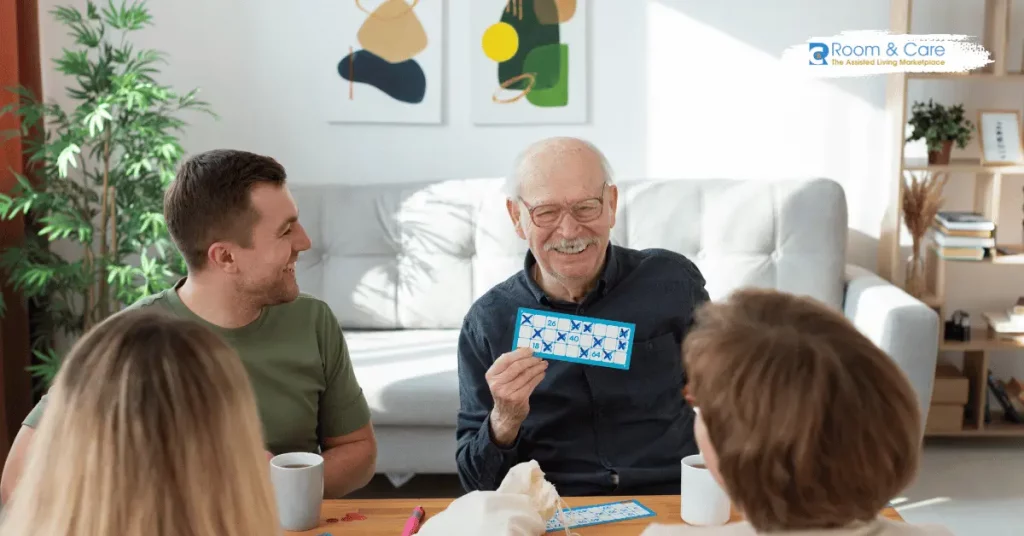

As people age, maintaining cognitive health becomes increasingly important for preserving independence, enhancing the quality of life, and preventing cognitive decline. Whether living at home, in adult family homes, assisted living facilities, nursing homes, or other senior communities, seniors can significantly benefit from practices and interventions aimed at improving cognitive function. This article provides a comprehensive guide on how to enhance cognitive abilities in older adults, offering practical advice, scientifically-backed strategies, and tips for families and caregivers.
Cognitive decline is a common concern among older adults, but it doesn’t have to be an inevitable part of aging. Cognitive function encompasses various mental abilities, including memory, decision-making, attention, and problem-solving skills. As these functions deteriorate, it can affect an individual’s daily life, independence, and emotional well-being.
Several factors contribute to cognitive decline, such as genetics, lifestyle choices, and health conditions like dementia or Alzheimer’s disease. However, research shows that certain lifestyle adjustments and proactive measures can help maintain or even improve cognitive function in the elderly.
In senior living communities, such as adult family homes or assisted living facilities, enhancing cognitive health is a priority. These environments provide structured activities, social engagement opportunities, and professional support that can make a significant difference in maintaining mental acuity. Below, we explore the best strategies to improve cognitive function in elderly individuals.
Just as physical exercise keeps the body healthy, mental exercises keep the brain fit. Regular cognitive stimulation can help improve memory, attention, and problem-solving skills. Activities such as puzzles, crosswords, chess, and Sudoku are excellent for keeping the mind active. These activities encourage critical thinking and improve the brain’s plasticity, which is its ability to adapt and grow new neural connections.
In senior living communities, brain-training sessions are often part of daily activities. For example, assisted living facilities may offer memory games, storytelling sessions, or computer-based cognitive training programs. These exercises can be tailored to individual needs and preferences, making cognitive stimulation both effective and enjoyable.
Practical Tips for Mental Stimulation:
Social interaction is a powerful tool for maintaining cognitive health. Engaging with others stimulates multiple cognitive functions, including memory, language, and emotional regulation. Social activities can also reduce feelings of loneliness and depression, which are risk factors for cognitive decline.
Senior living communities are ideal for fostering social connections. Activities such as group exercises, hobby clubs, cultural outings, and shared meals offer numerous opportunities for interaction. In assisted living facilities and nursing homes, staff often organize events that encourage participation, such as bingo nights, movie screenings, or music therapy sessions. These activities are not only fun but also critical for mental health and cognitive function.
Practical Tips for Enhancing Social Engagement:

Physical activity is not only good for the body but also essential for the brain. Regular exercise has been shown to improve cognitive function, reduce the risk of dementia, and enhance overall brain health. Physical activities like walking, swimming, dancing, or even light gardening can boost blood flow to the brain, increase the production of brain-derived neurotrophic factor (BDNF), and stimulate the growth of new neurons.
Many senior living communities incorporate physical exercise programs tailored to the abilities and needs of their residents. These programs might include low-impact aerobic exercises, strength training, yoga, or Tai Chi, which are excellent for both cognitive and physical health. Activities like chair aerobics or balance exercises can also be adapted for those with mobility issues.
Practical Tips for Encouraging Physical Activity:
A balanced diet plays a critical role in cognitive health. Foods rich in antioxidants, omega-3 fatty acids, and essential vitamins are known to protect the brain from oxidative stress and inflammation, both of which are linked to cognitive decline. A diet that includes plenty of fruits, vegetables, whole grains, lean proteins, and healthy fats can significantly boost brain function.
In senior living communities, such as adult family homes and nursing homes, meal plans often emphasize brain-healthy foods. Some facilities offer cooking classes or nutrition workshops to help residents make better food choices, promoting not only cognitive health but also overall wellness.
Practical Tips for Promoting a Healthy Diet:
Quality sleep is essential for cognitive health. Poor sleep or sleep disorders, such as insomnia or sleep apnea, have been linked to cognitive decline and an increased risk of dementia. During sleep, the brain consolidates memories, clears out toxins, and repairs itself. Therefore, seniors should aim for 7-8 hours of uninterrupted sleep each night to maintain optimal cognitive function.
Creating a sleep-friendly environment in senior living communities can make a significant difference. Assisted living facilities and nursing homes can promote good sleep hygiene by ensuring a quiet, comfortable, and dark sleeping environment, maintaining consistent sleep routines, and addressing any sleep-related issues promptly.
Practical Tips for Improving Sleep Quality:
Chronic stress can negatively affect cognitive function by increasing inflammation and causing brain cell damage. Learning to manage stress effectively is crucial for maintaining cognitive health, especially in older adults who may face various stressors, such as health issues, loss, or significant life changes.
Relaxation techniques like mindfulness meditation, breathing exercises, and yoga can help reduce stress and improve cognitive function. Many senior living communities offer relaxation classes or mindfulness sessions as part of their wellness programs. Providing residents with the tools to manage stress can have a significant impact on their cognitive health.
Practical Tips for Stress Management:
Technology offers innovative ways to maintain and improve cognitive function in the elderly. Digital tools, such as brain-training apps, virtual reality experiences, and online courses, provide engaging and effective ways to stimulate cognitive function.
Many senior living communities have started to incorporate technology into their daily routines. For example, virtual reality can provide immersive experiences that stimulate memory and cognitive functions. Tablets and smartphones can offer access to cognitive training apps and social media, keeping seniors mentally active and socially connected.
Practical Tips for Incorporating Technology:

1. How does physical activity enhance cognitive function in the elderly?
Physical activity improves blood flow to the brain, stimulates the release of growth factors, and promotes neurogenesis, all of which are vital for maintaining and improving cognitive function.
2. Can social engagement reduce the risk of cognitive decline?
Yes, social engagement stimulates various cognitive functions and helps reduce the risk of cognitive decline by providing emotional support and reducing feelings of loneliness and isolation.
3. What dietary choices are best for cognitive health in seniors?
A diet rich in antioxidants, omega-3 fatty acids, vitamins, and minerals is best for cognitive health. Foods such as berries, leafy greens, nuts, and fish are particularly beneficial.
4. How can sleep affect cognitive function in older adults?
Quality sleep is crucial for cognitive function as it helps consolidate memories, repair brain cells, and remove toxins that can contribute to cognitive decline.
5. What role do senior living communities play in cognitive health?
Senior living communities provide a structured environment with access to activities, social engagement, professional care, and cognitive stimulation, all of which are essential for maintaining cognitive health.
Improving cognitive function in the elderly involves a holistic approach that integrates mental stimulation, social engagement, physical activity, a balanced diet, quality sleep, stress management, and the use of technology. Each of these components plays a critical role in supporting brain health and overall well-being. Senior living communities, such as adult family homes, assisted living facilities, and nursing homes, offer environments that promote these activities and help seniors maintain cognitive function.
At Room and Care, we are dedicated to helping families find the best senior living options to support cognitive health. Whether you’re looking for an assisted living facility, adult family home, memory care facility, nursing home, or independent living community, we offer direct access with no referral fees or hidden costs. Our service ensures you find the best care options at the most affordable rates.